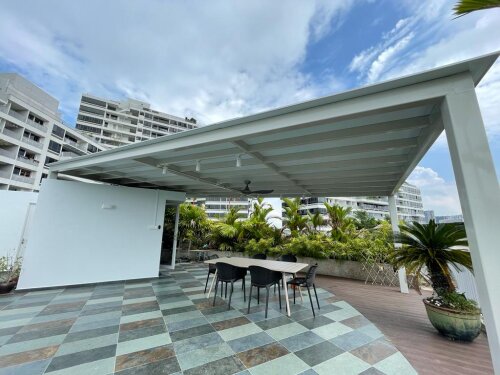Best Climate Change Law Lawyers in City Hall
Share your needs with us, get contacted by law firms.
Free. Takes 2 min.
List of the best lawyers in City Hall, Singapore
About Climate Change Law in City Hall, Singapore
Climate Change Law in City Hall, Singapore refers to the set of legal frameworks, regulations, and government policies designed to address climate change and environmental sustainability. These laws impact individuals, businesses, and organizations within the City Hall area and across Singapore. They cover a wide range of topics including greenhouse gas emissions, sustainable development, carbon trading, waste management, energy regulation, climate risk disclosures, and adaptation strategies. The government is increasingly implementing robust standards and compliance measures aligned with international agreements like the Paris Agreement, aiming to create a more environmentally sustainable and resilient city.
Why You May Need a Lawyer
Individuals and businesses may need legal support with Climate Change Law for several reasons:
- You are developing or running a business that must comply with emissions reduction targets and environmental regulations.
- Your organization is navigating complex permit and licensing requirements for activities that impact the environment.
- You are involved in infrastructure or real estate development projects that require environmental impact assessments.
- You need advice on reporting obligations such as climate risk disclosures or greenhouse gas inventories.
- You want to challenge or appeal regulatory decisions or penalties related to environmental non-compliance.
- You are affected by changes in land use plans or zoning laws related to climate adaptation measures.
- You wish to participate in public consultations or community initiatives on climate policy.
- You are facing enforcement action or litigation related to pollution, waste, or non-compliance with environmental standards.
- You wish to understand opportunities or obligations in green finance, carbon credits, or sustainability-linked incentives.
- You need advice on integrating sustainable practices into corporate governance or procurement procedures.
Local Laws Overview
Climate Change Law within City Hall, Singapore is shaped by national and local legislation, as well as municipal requirements:
- Environmental Protection and Management Act (EPMA) - Provides the legal backbone for Singapore's environmental regulation including air, water, and noise pollution.
- Carbon Pricing Act - Imposes a carbon tax on large greenhouse gas emitters, incentivising emission reduction and cleaner technologies.
- Resource Sustainability Act - Addresses waste management, sustainable production, and recycling regulations.
- Energy Conservation Act - Requires certain industries to implement energy management practices and report energy use and emissions.
- Planning Act and Building Control Act - Integrate sustainable development, green building standards, and climate resilience into urban planning and construction.
- Singapore is committed to its Green Plan 2030 and nationally determined contributions under the Paris Agreement, driving policy at the local level including City Hall.
- Public and private entities in City Hall often implement additional sustainability measures that go beyond statutory requirements.
Frequently Asked Questions
What is the Carbon Pricing Act and who does it affect?
The Carbon Pricing Act is a law that imposes a tax on businesses emitting more than 25,000 tonnes of greenhouse gases annually. It mainly targets large industrial facilities but has an indirect impact on supply chains and consumers in the City Hall area.
Do small businesses need to worry about compliance with Climate Change Law?
While most obligations are aimed at larger companies, all businesses should be aware of waste management, energy use, and supply chain sustainability. Some grants and incentives are available for small businesses adopting green practices.
How do climate regulations affect property development in City Hall?
All developments are subject to environmental impact assessments, green building requirements, and resilience planning to cope with future climate risks like flooding and heat.
What penalties exist for not complying with climate-related laws?
Penalties can include fines, business operation restrictions, or legal actions. The Environmental Protection and Management Act and Carbon Pricing Act set out specific enforcement mechanisms for breaches.
Are there incentives for adopting green technologies?
Yes, the government encourages the adoption of renewable energy, energy efficiency, and low-carbon technologies through grants and tax incentives available to qualifying businesses and property owners.
Can individuals participate in shaping climate policy in City Hall?
Individuals and community groups are encouraged to take part in public consultations, dialogues, and feedback sessions related to local and national climate initiatives.
What should I do if I receive a notice of environmental non-compliance?
It is advisable to consult a lawyer with experience in local environmental law immediately to evaluate your case, respond appropriately, and where possible, appeal or mitigate any penalties.
How does climate law relate to workplace safety?
Companies must manage occupational risks posed by climate change, such as extreme weather and heat. Workplace safety regulations now incorporate environmental and climate adaptation measures.
Are public institutions in City Hall held to the same climate standards as private companies?
Yes, government bodies, schools, and public service providers are required to comply with environmental laws and usually lead by example through sustainable procurement and energy use policies.
Can businesses get legal advice on green financing or sustainability-linked loans?
Yes, lawyers specializing in climate law can advise businesses on the legal requirements, benefits, and documentation needed for green financial products, including sustainability-linked loans and carbon trading.
Additional Resources
For further help and legal advice, consider consulting the following resources:
- National Environment Agency (NEA) - Regulates and enforces environmental and climate-related laws.
- Ministry of Sustainability and the Environment (MSE) - Oversees national climate initiatives, policy development, and legal frameworks.
- Singapore Law Society - Provides directories to find qualified lawyers in Climate Change Law and related fields.
- Urban Redevelopment Authority (URA) - Guides on sustainable planning and green building permits.
- Centre for International Law (CIL) at NUS - Offers research and events on international and national climate law.
- Sustainability-related departments in major law firms - Many top law firms in Singapore have dedicated environmental and climate law teams with experience in City Hall-specific matters.
Next Steps
If you need support or legal advice on a matter relating to Climate Change Law in City Hall, Singapore:
- Clearly identify your issue and gather as much documentation as possible (correspondence, permits, notices, business or project plans).
- Reach out to a qualified lawyer with experience in environmental or climate change law who understands the local context of City Hall.
- Schedule an initial consultation to discuss your situation, legal obligations, deadlines, and potential solutions.
- Follow up on any guidance provided promptly and keep records of all communications and steps taken.
- Where appropriate, engage with relevant government agencies or participate in public consultations to stay informed about new policies and initiatives that may affect you.
Seeking the right legal advice early can help you avoid costly penalties, navigate complex regulations, and contribute positively to Singapore’s sustainability efforts.
Lawzana helps you find the best lawyers and law firms in City Hall through a curated and pre-screened list of qualified legal professionals. Our platform offers rankings and detailed profiles of attorneys and law firms, allowing you to compare based on practice areas, including Climate Change Law, experience, and client feedback.
Each profile includes a description of the firm's areas of practice, client reviews, team members and partners, year of establishment, spoken languages, office locations, contact information, social media presence, and any published articles or resources. Most firms on our platform speak English and are experienced in both local and international legal matters.
Get a quote from top-rated law firms in City Hall, Singapore — quickly, securely, and without unnecessary hassle.
Disclaimer:
The information provided on this page is for general informational purposes only and does not constitute legal advice. While we strive to ensure the accuracy and relevance of the content, legal information may change over time, and interpretations of the law can vary. You should always consult with a qualified legal professional for advice specific to your situation.
We disclaim all liability for actions taken or not taken based on the content of this page. If you believe any information is incorrect or outdated, please contact us, and we will review and update it where appropriate.










